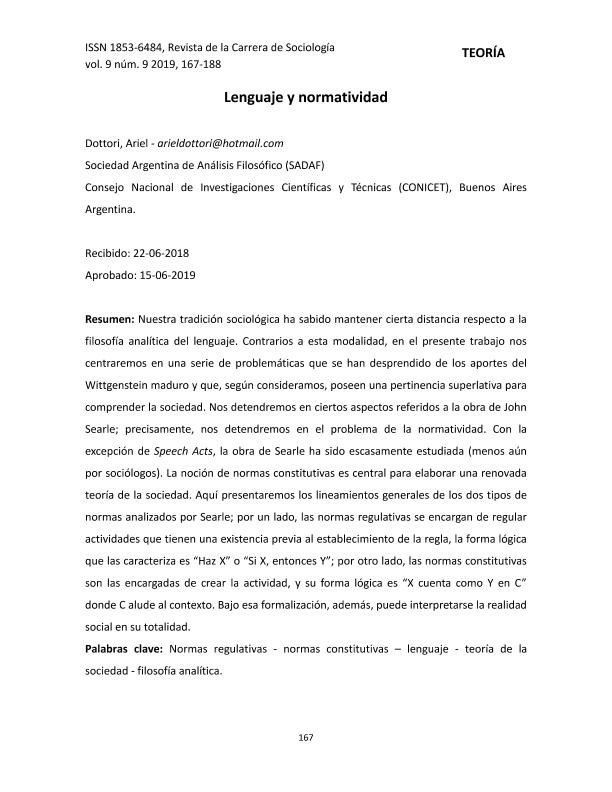Artículo
Nuestra tradición sociológica ha sabido mantener cierta distancia respecto a la filosofía analítica del lenguaje. Contrarios a esta modalidad, en el presente trabajo nos centraremos en una serie de problemáticas que se han desprendido de los aportes del Wittgenstein maduro y que, según consideramos, poseen una pertinencia superlativa para comprender la sociedad. Nos detendremos en ciertos aspectos referidos a la obra de John Searle; precisamente, nos detendremos en el problema de la normatividad. Con la excepción de Speech Acts, la obra de Searle ha sido escasamente estudiada (menos aún por sociólogos). La noción de normas constitutivas es central para elaborar una renovada teoría de la sociedad. Aquí presentaremos los lineamientos generales de los dos tipos de normas analizados por Searle; por un lado, las normas regulativas se encargan de regular actividades que tienen una existencia previa al establecimiento de la regla, la forma lógica que las caracteriza es “Haz X” o “Si X, entonces Y”; por otro lado, las normas constitutivas son las encargadas de crear la actividad, y su forma lógica es “X cuenta como Y en C” donde C alude al contexto. Bajo esa formalización, además, puede interpretarse la realidad social en su totalidad. Our sociological tradition has managed to maintain a certain distance from the analytic philosophy of language. Contrary to this modality, in the present work we will focus on a series of problems that have emerged from the contributions of the mature Wittgenstein and, as we believe, have a superlative relevance to understand society. We will dwell on certain aspects of the work of John Searle; precisely, we will stop at the problem of normativity. With the exception of Speech Acts, the work of Searle has been scarcely studied (still less by sociologists). The notion of constitutive norms is central to the elaboration of a renewed theory of society. Here we will present the general guidelines of the two types of norms analyzed by Searle; on the one hand, the regulative rules are in charge of regulating activities that have a prior existence to the establishment of the rule, the logical form that characterizes them is "Make X" or "If X, then Y"; on the other hand, the constitutive rules are responsible for creating the activity, and its logical form is "X counts as Y in C" where C alludes to the context. Under this formalization, in addition, social reality can be interpreted as a whole.
Lenguaje y normatividad
Fecha de publicación:
09/2019
Editorial:
Universidad de Buenos Aires. Facultad de Ciencias Sociales. Carrera de Sociología
Revista:
Revista de la carrera de Sociología
ISSN:
1853-6484
e-ISSN:
2362-3306
Idioma:
Español
Tipo de recurso:
Artículo publicado
Clasificación temática:
Resumen
Palabras clave:
LENGUAJE
,
NORMAS REGULATIVAS
,
NORMAS CONSTITUTIVAS
,
FORMALIZACIÓN
Archivos asociados
Licencia
Identificadores
Colecciones
Articulos(IIF)
Articulos de INSTITUTO DE INVESTIGACIONES FILOSOFICAS
Articulos de INSTITUTO DE INVESTIGACIONES FILOSOFICAS
Citación
Dottori, Ariel Oscar; Lenguaje y normatividad; Universidad de Buenos Aires. Facultad de Ciencias Sociales. Carrera de Sociología; Revista de la carrera de Sociología; 9; 9; 9-2019; 167-188
Compartir




